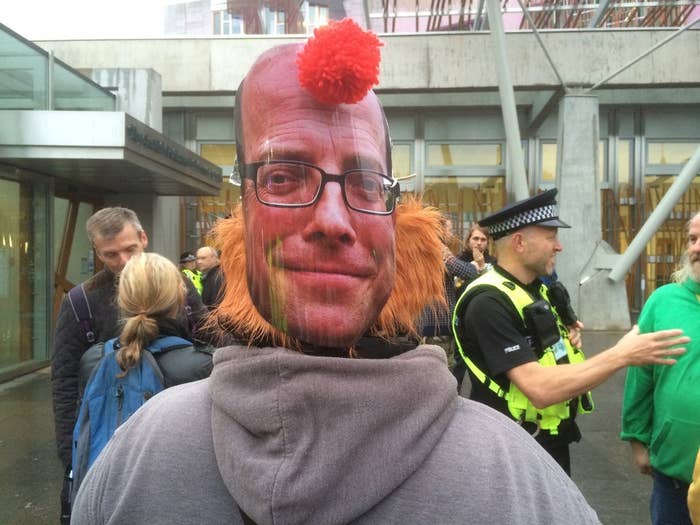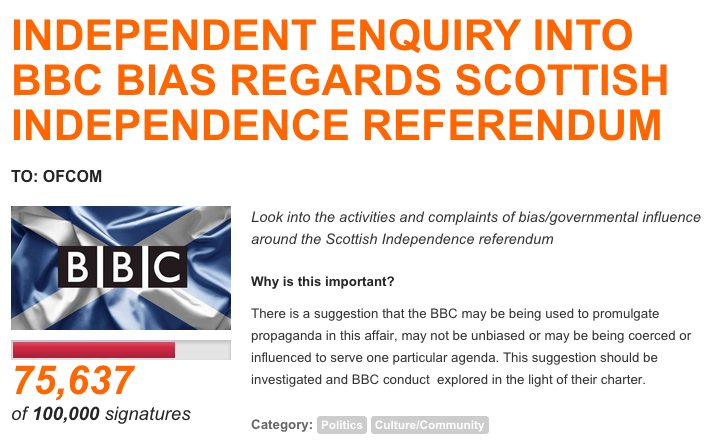
EDINBURGH – As Scotland's Yes voters come to terms with their country's rejection of independence, some have begun blaming the "mainstream media" for costing them the election. And the BBC is the No. 1 target.
"I'm devastated by [the BBC's] coverage, it's been lying and manipulative," said Siobhan Moran, a Yes voter standing outside the Scottish parliament building in Edinburgh. "I've cancelled my TV licence – I'm working on my laptop, and I will never watch the BBC again. That's not something I say lightly. I am gutted at the way they reported the referendum."
To her mind, the organisation's coverage "absolutely" swung the final result: "Throughout my entire life I've been an advocate of the BBC. But I am absolutely disgusted that their presenters are great everywhere else in the world but not in their own country."
Nearby, another disappointed Yes voter wandered around wearing a mask of Nick Robinson, the BBC's political editor. Robinson last week found himself the target of Yes ire after editing a short sequence which said SNP leader Alex Salmond had not answered his question properly at a press conference. The Yes Scotland campaign claimed Salmond had actually answered the question, the clip went viral, and Robinson soon found his likeness painted on banners at anti-BBC protests organised by Yes supporters.
Whether there is a yes or no vote, we will never forget the horrific bias of the bbc #bbcindyref #bbcbias
BBC showed up to George Sq tonight. Crowd were chanting "Fuck the BBC" so loudly that they couldn't film vox pops. Left to intense booing.
Time and time again on the campaign trail, Yes voters said they had lost trust in mainstream newspapers and broadcasters during the referendum, often after they failed to cover one specific Yes Scotland event or another.
Many of the same Yes voters said they believed the result could have been different if only the media had been more pro-independence. And if you believe independence would have cured many of Scotland's social problems, then the supposedly anti-independence media is partly responsible for those problems.
"I think [the BBC] is shocking," said Ellen, a 35-year-old Yes voter, speaking on the eve of the poll. She also pledged to stop paying the licence fee in protest at perceived pro-union bias. "They're supposed to be a public service broadcaster. In the last week they've shown themselves very much on the unionist side.
"The papers are just as bad. Only The Herald has given Yes fair coverage."
Ellen, who would not give her second name, said she works in communications, "so I know what I'm talking about". She said she preferred to get her referendum news from Wings Over Scotland, the rabidly pro-independence blog, which has quite different editorial standards to traditional broadcasters, and "social media, things on Facebook".
There is now a 38 Degrees petition with 75,000 signatures alleging BBC bias.

Mary Jones, a 58-year-old retired social worker and Yes voter, said she has lost faith in the broadcaster during the campaign: "I used to believe that what was on the BBC was the truth. That they were there to report the truth to the people. But I don't think they are now at all."
The BBC went to enormous lengths to be impartial during the referendum campaign, even shipping in staff from elsewhere in the UK to do much of the coverage in the hope they were not already associated with either side. But that has done little to placate Yes campaigners who partly blame it for the poll defeat.
"There's going to be a lot of campaign people who will turn their anger on the BBC" said Glaswegian Alan McPherson, another Yes voter. "A campaign to not pay your TV licence – like we did with the poll tax."
The mainstream media – and the BBC in particular – will take a while to win back hundreds of thousands of ordinary Scots who, wrongly or rightly, believe their coverage wasn't pro-independence enough.

